- Home
- Elizabeth Goudge
The Little White Horse Page 9
The Little White Horse Read online
Page 9
Zachariah, meanwhile, mounted upon another stool beside the dwarf, and sat there purring and swinging his tail and occasionally stretching out a huge paw and helping himself very daintily to a piece of pastry. It was obvious that these two were affectionate and inseparable companions, and that he was privileged. And there wasn’t much difference in their size, Zachariah being nearly as big as the dwarf.
Sitting humbly on her bench, Maria looked at the dwarf. He wasn’t looking at her now, he was absorbed in his pastry, and so she was able to have a real good stare. Never had she seen such a creature, and her lips parted slightly in astonishment.
He must, she thought, be very old, for the fringe of whisker that encircled his whole face like a ham frill was snow white, and so were his bushy eyebrows. Except for the whisker frill, his face was clean-shaven, brown as an oak-apple, and criss-crossed with hundreds of little wrinkles. His nose was so snug that there seemed very little of it; but what there was of it was evidently sensitive, for it quivered as he worked, like a rabbit’s. His sense of smell, like that of all good cooks, was obviously very highly developed indeed. His large mouth was a great half-moon of generosity when he smiled, a rat-trap of determination when he shut it. His brown ears were much too big for the rest of him, but they were beautifully shaped and tapered to a delicate point, like a fawn’s. His arms, too, were much too big for the rest of him, and when he let them hang down his big brown hands reached nearly to his ankles. His feet, on the contrary, were small and dainty as a child’s, but he was very bow-legged and his hump was as pronounced as that of Mr Punch.
But in spite of being so oddly assorted in the matter of limbs he was, nevertheless, a delight to the eye because of the sparkling cleanliness of his person and the brightness of his clothes. Upon his head he wore a scarlet skull-cap. His coat and breeches were heather-coloured, and were worn with an emerald-green waistcoat, embroidered with scarlet poppies. His worsted stockings were heather-coloured too, and his brown shoes were ornamented with shining silver buckles. He wore a snow-white apron with a bib to it, to protect his finery while he worked.
It was a delight to watch Marmaduke Scarlet making pastry, for if ever a man was a master-craftsman at his work that man was Marmaduke. He wielded his rolling-pin like a king’s sceptre, and so light was his pastry that it looked more like sea-foam than dough as he flicked it over on his board. Beside him stood a great dish full of succulent chunks of veal and ham, hard-boiled eggs, parsley, and chopped onion. Maria’s mouth watered as she looked at it, and when he swung the great oval of white pastry over it she had to swallow hard. Then he started to make the decorations for the top of it, his skilful fingers pinching out flowers and leaves from the dough with an artistry that any sculptor might have envied.
When it was done he carried it to one of the fireplaces, where a log fire was burning low, cleared a space for it, set it on the hearth, and covered it with an iron cover and then with a mound of hot ashes. Then he went to one of the bread ovens and opened the iron door, and inside Maria saw that a bundle of burning faggots was just dropping to hot ash, and that the bricks that lined the oven were glowing hot. Marmaduke raked the ashes to one side, lifted a white cloth from two great bowls on the floor, where the bread had been set to rise, put the loaves in the oven, and slammed the door.
Then he went through one of the doors in the wall, through which Maria could see a cool stone-vaulted larder, and came back with a big blue bowl full of eggs and a blue jug of cream; and, mounting once more upon his stool, he proceeded to make a syllabub. Twelve eggs went to the making of the syllabub, a pint of cream, and cinnamon for flavouring.
‘I wonder now,’ thought Maria to herself, ‘will Miss Heliotrope be able to eat that syllabub after that pie?’
But she need not have worried, for it appeared that Marmaduke’s sensitive quivering nose had scented from afar a box of peppermints in Miss Heliotrope’s reticule. For as soon as he had whisked up the syllabub he made a nice plain junket, with a dash of brandy in it, and nutmeg on the top.
‘For her first course,’ he squeaked, suddenly breaking a silence that had lasted for a very long time, ‘there will be a coddled egg.’
It seemed that Marmaduke Scarlet had finished cooking for the moment. He stacked his cooking things neatly together, fetched a big red earthenware bowl, and filled it with warm water from the kettle on the hearth . . . Maria dared to speak at last.
‘If you are going to wash up, may I dry?’ she asked humbly.
Marmaduke Scarlet considered the question. ‘Are you able to give me your absolute assurance that you are not a smasher?’ he demanded.
‘I don’t think I am,’ said Maria. ‘Of course I don’t really know, because I’ve not dried up before.’
‘Are you accustomed to drop your hairbrush when arranging your coiffure of a morning?’ demanded Marmaduke.
‘No, never,’ Maria assured him.
‘Then you may dry,’ he said graciously. ‘You may take one of those dishcloths from the line, fetch yourself a stool, and give me the benefit of your assistance during those ablutions that necessarily, though unfortunately, invariably follow the exercise of the culinary art.’
Marmaduke Scarlet, it seemed, made up for the shortness of his stature by using very long words in conversation. It struck Maria that if she had much to do with him she would need to keep a dictionary in her pocket.
She fetched the cloth and stool as bidden, and the three of them, Maria and Marmaduke and Zachariah the cat, grouped themselves in a row at the table, Marmaduke standing on his stool and Maria and Zachariah sitting; and Marmaduke washed and Maria dried and Zachariah just purred. Marmaduke looked quite sunny and good-tempered now that he was no longer cooking, and Maria dared to ask him the question that had been burning on the tip of her tongue ever since she had observed his tiny size.
‘Please, Mr Scarlet,’ she asked, ‘is it you who looks after me in my room, lighting my fire and bringing me warm water and milk and sugar biscuits?’
Marmaduke gave her another of his glorious wide benevolent smiles, the ends of it running right up into his ears. ‘Naturally, young Mistress,’ he squeaked. ‘Who else in this establishment, besides yourself, is of sufficiently delicate stature to get through the aperture that leads to your bed-chamber? And if for any reason I don’t wish to be seen passing through the hall, I climb up the cedar-tree from the garden and into your room through the window to do for you those small services that are my duty.’
‘Thank you, oh, thank you,’ said Maria. ‘And do you put those lovely clothes ready for me, and lay the little bunches of flowers on them?’
But now, alas, she had said the wrong thing. Marmaduke’s face darkened like a thundercloud, his smile broke abruptly in half, the two ends disappearing into his ears like rabbits bolting into their burrows, his great bushy eyebrows beetled at her, and his eyes shot sparks, and when he spoke his voice ceased to be a squeak and boomed at her like a roll of thunder.
‘Does my appearance suggest that of a female lady’s maid?’ he demanded. ‘Does any self-respecting male concern himself with ribbons and laces and female rubbish? Allow me to inform you, young Mistress, that if there is one thing in this universe for which I have not the slightest partiality it is a female. And my master, the Squire, entertains in his bosom the same sensations of distaste for the daughters of Eve as those that lodge in the breast of his humble retainer. Until you and your lady governess arrived upon the steps of this mansion no female had darkened our doors for twenty years.’
This was awful.
‘But Miss Heliotrope and I couldn’t help being born females,’ faltered Maria.
‘I am unaware that we have blamed you for it,’ said Marmaduke. ‘It is my distinct impression that we have received you with our best courtesy and cookery, and made the best of an unfortunate circumstance that admitted of no circumlocution.’
‘You’ve both been very kind,’ faltered Maria.
The ends of Marmaduke’s smile sudde
nly came out of his ears and attached themselves to the corners of his mouth again.
‘The circumstances might have borne upon the Squire and myself with more heaviness than has actually been the case,’ he conceded kindly. ‘You, Mistress, are of tender years; and femininity, my dear young lady, grows on a female with the passage of time, like all bad habits, and is less objectionable in the early stages. And as for your lady governess, she is a distinct improvement upon that other duenna, who resided here before with the other young mistress, and never stopped asking questions. Through the keyhole I have perceived her to be a woman of great saintliness of character and weakness of digestion, characteristics which, by concentrating a lady’s mind upon her own soul and stomach, do not allow her to indulge in that feminine curiosity about the affairs of others which renders her presence so trying to the males whose domicile she shares.’
Maria flushed rosily and refrained from asking who it was who laid out her clothes for her. She was also afraid to ask about the other young mistress, and that other duenna, though she was dying to ask who they were. Nor did she dare ask Marmaduke Scarlet where his bedroom was, though she was dying to ask that too, because she could not think whereabouts in the house it could possibly be.
‘Young Mistress,’ said Marmaduke, ‘the fact that I am disposed to look upon your presence here with favour does not mean that I desire to have you running in and out of my kitchen all day long. I do not. My kitchen is my private domain, to be entered only on my invitation. That invitation will be conveyed to you from time to time by myself, or by Zachariah the cat.’
And then with a wave of the hand and a courteous bow he signified, as a king might do, that the interview was now at an end. Maria curtsied to him and withdrew humbly, Zachariah attending her as far as the kitchen door and standing on his hind legs to lift the latch for her.
She raced through the hall and the parlour and up the tower stairs to Miss Heliotrope’s room.
‘Miss Heliotrope,’ she gasped, ‘there is a cook, a funny frightening little dwarf with a white beard and a scarlet cap, who uses dreadfully long words and doesn’t like females . . . But he doesn’t mind us so much because you’re so good and I’m so young. He brings our hot water and lights our fires, but he doesn’t see to my clothes . . . Miss Heliotrope, who does see to my clothes?’
Miss Heliotrope, darning needle in hand, turned from the mending of her curtains. ‘Some woman,’ she said. ‘They may say what they like, Maria, about no woman having entered this house for twenty years, but there is a woman about the place . . . Look at this.’
She opened the bottom drawer of her chest of drawers and beckoned to Maria to come and see. Tenderly laid out in the drawer were three lace fichus and three mob-caps trimmed with heliotrope ribbon. And between the folds of the fichus were three little lavender-bags made of white muslin, each embroidered with a different heliotrope flower — a violet, a pansy, and an autumn crocus.
‘It is real Honiton,’ said Miss Heliotrope in a sort of ecstasy. ‘Real Honiton — quite priceless — such as I’ve always longed for. And those ribbons — my favourite colour — echoing my name — and the flowers on the bags — I never saw such perfect embroidery. Maria, I ask you, could any man, any mere man, have prepared that drawerful of delight that you see before you?’
‘No,’ said Maria.
CHAPTER SIX
1
WHEN she woke up the next morning, Maria found to her great surprise that her riding habit had not been put ready for her. Instead there had been laid out a very decorous dark-blue gown with plain white linen collar and cuffs, a dark-blue cloak, and a dark-blue straw bonnet with delphinium-blue ribbons.
Maria was not very fond of this costume. In spite of the ribbons, it was rather a sombre and serious outfit, and it made her feel as serious as itself. However, she knew better than to put it away and get out her habit, for she realized now that what she did day by day was not left entirely to her own choice. She was more or less under orders. And it seemed that her orders today did not include riding.
She put on the blue gown slowly, her mood in tune with the grey day outside her windows. There was no sun to be seen today, no blue sky. Grey clouds hung low over the world. But it was warm and still, and bird-song rose up to her from the rose-garden under her west window. She hoped it would not rain, for she knew that Digweed had driven off in the gig very early this morning to make some purchases in the market-town beyond the hills that enclosed the valley, and she would not like him to get wet.
With her cloak over her arm and her bonnet swinging from her hand, leaving Wiggins still sleeping on her bed, she went down to the parlour, opened the window, and looked out at the tangled briars where now a few fresh green leaves were unfurling. There seemed more birds than ever this morning, their bright wings like flowers among the branches. They were singing so lustily that she felt that she must sing too. She crossed the room, opened the harpsichord and sang the little song that she had liberated from it.
She went on singing until, once more, there came to her the knowledge that there was a listener in the rose-garden. She got up, went to the open window and looked out. And this time the listener was not the small fairy-like figure who had vanished like a dream, but a tall old man who came out from among the rose-trees and came up to the window and held out his hand to her.
It was Old Parson. Without a word Maria put on her bonnet and cloak, climbed up on the window-sill, stepped out of the window, took his hand, and jumped down beside him; and hand in hand and in silence they walked through the rose-garden and the formal garden and out into the park.
Old Parson walked fast, moving with long strides, like quite a young man. He looked very purposeful indeed this morning, and a little grim, and the lean hand that held Maria’s held it hard and possessively. He had some business with her, that Maria knew. But she was not afraid. And when he turned and smiled down at her she was more than not afraid; she was elated. She had the feeling that her introduction to Moonacre was more or less completed, and that today the purpose of her being here would declare itself.
‘Where are we going, please, Sir?’ she dared to ask.
‘To the church,’ said Old Parson. ‘I have much to show you there. And after that you will take breakfast with me at the Parsonage. It is early yet, but there is much to say and much to do, and we are well-advised to make an early start.’
‘Will they be anxious about me if I am not back to breakfast?’ asked Maria.
‘No,’ said Old Parson. ‘I left a message with Zachariah the cat.’
2
They took the way that the coach had taken on Sunday, and came out through the broken gate into the village street, and so to the lych-gate. They walked up through the churchyard to the church, and Old Parson pushed open the heavy door and bowed courteously to Maria as she preceded him inside.’ Why!’ she cried in astonishment. ‘The church is full of children!’
‘Children wake up very early in the mornings,’ said Old Parson, ‘and are a great nuisance to their parents, getting in their mothers’ way while the breakfasts are being prepared, or else following their fathers out to the milking, and irritating the cows by their noise and clatter. I therefore gather them together here and keep them amused until their breakfasts are ready for them.’
They had entered quietly, and Maria had a moment or two to look about her before the children saw her. There were perhaps about thirty boys and girls in the church, none of them more than about twelve years old, and quite a number of small toddlers of two or three. They looked like flowers in their bright clothes, and they were gathered in happy groups all about the church, chattering like starlings and intent upon various mysterious games.
‘Children!’ called Old Parson, leading Maria up to the clear space by the chancel steps. ‘Children. Maria Merryweather is with us.’
He spoke as though this were something very important, and the children evidently thought it was too, for they left their games and came crowding roun
d Maria, smiling at her with shy friendliness.
‘Show her the Lady and the Bell,’ Old Parson commanded them. ‘And then later we will sing her the Bell Song.’
Maria’s right hand was taken by a pretty little girl as tall as herself, with curly fair hair and a forget-me-not blue dress, whom later she discovered to be Prudence Honeybun, the innkeeper’s daughter, while a little round fat brown boy of four years old or so, whose roundness and brownness and glossiness reminded her of a horse-chestnut, attached himself limpet-like to her left hand. His name, the other children told her, was Peterkin Pepper.
Judged by the standards of today, the children of Silverydew had not a great number of toys in the church; indeed, they only had two, but as they were more than satisfied with what they had they were not to be pitied at all; and looking at these treasures through their eyes, Maria quite understood their satisfaction.
First they showed her the Bell, which stood upon the floor near the pulpit. It was a very old bell, and they told her that once there had been a monastery at the top of Paradise Hill, and that the bell had hung in the tower of the monastery church and seven times a day it had rung the monks to prayer, and the people in the valley below, hearing the Bell, had prayed too. They rang it to show Maria what a sweet tone it had, and they told her Old Parson let them use it when they played at being the monks, and when they played at christenings and weddings, or at being the bell-ringers.
‘The Silverydew Church bells are famous,’ they told Maria. ‘You can hear them miles away. Old Parson has made up a song about them. We’ll sing it to you presently. They all have names, you know, and when they were hung in the belfry they were christened just as human beings are. They were signed with the sign of the cross and anointed with oil and salt and wine.’

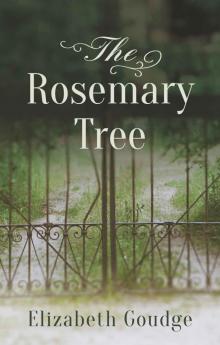 The Rosemary Tree
The Rosemary Tree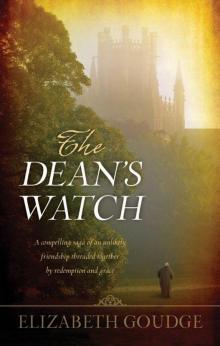 The Dean's Watch
The Dean's Watch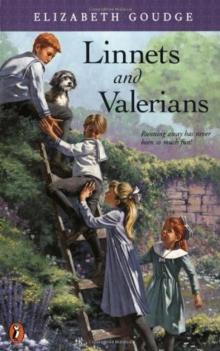 Linnets and Valerians
Linnets and Valerians Gentian Hill
Gentian Hill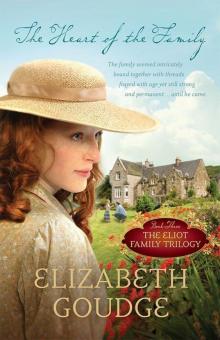 B00DRI1ZYC EBOK
B00DRI1ZYC EBOK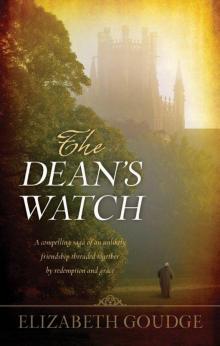 B008O6ZWTG EBOK
B008O6ZWTG EBOK The Scent of Water
The Scent of Water Pilgtim's Inn
Pilgtim's Inn Island Magic
Island Magic Pilgrim's Inn
Pilgrim's Inn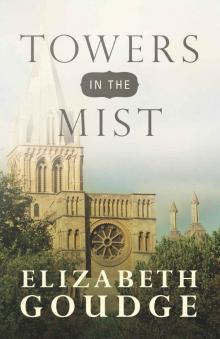 Towers in the Mist
Towers in the Mist Green Dolphin Street
Green Dolphin Street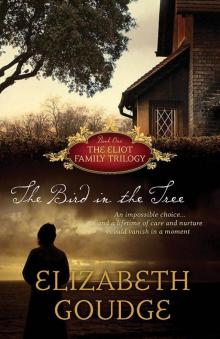 The Bird in the Tree
The Bird in the Tree The Child From the Sea
The Child From the Sea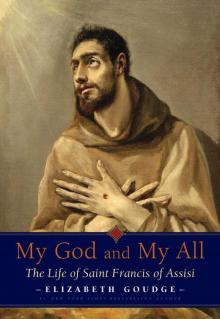 My God and My All: The Life of Saint Francis of Assisi
My God and My All: The Life of Saint Francis of Assisi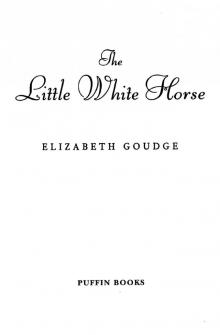 The Little White Horse
The Little White Horse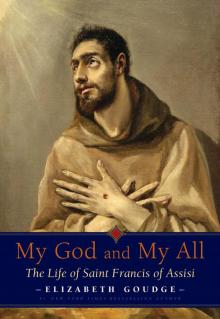 My God and My All
My God and My All B00CKXCNH8 EBOK
B00CKXCNH8 EBOK